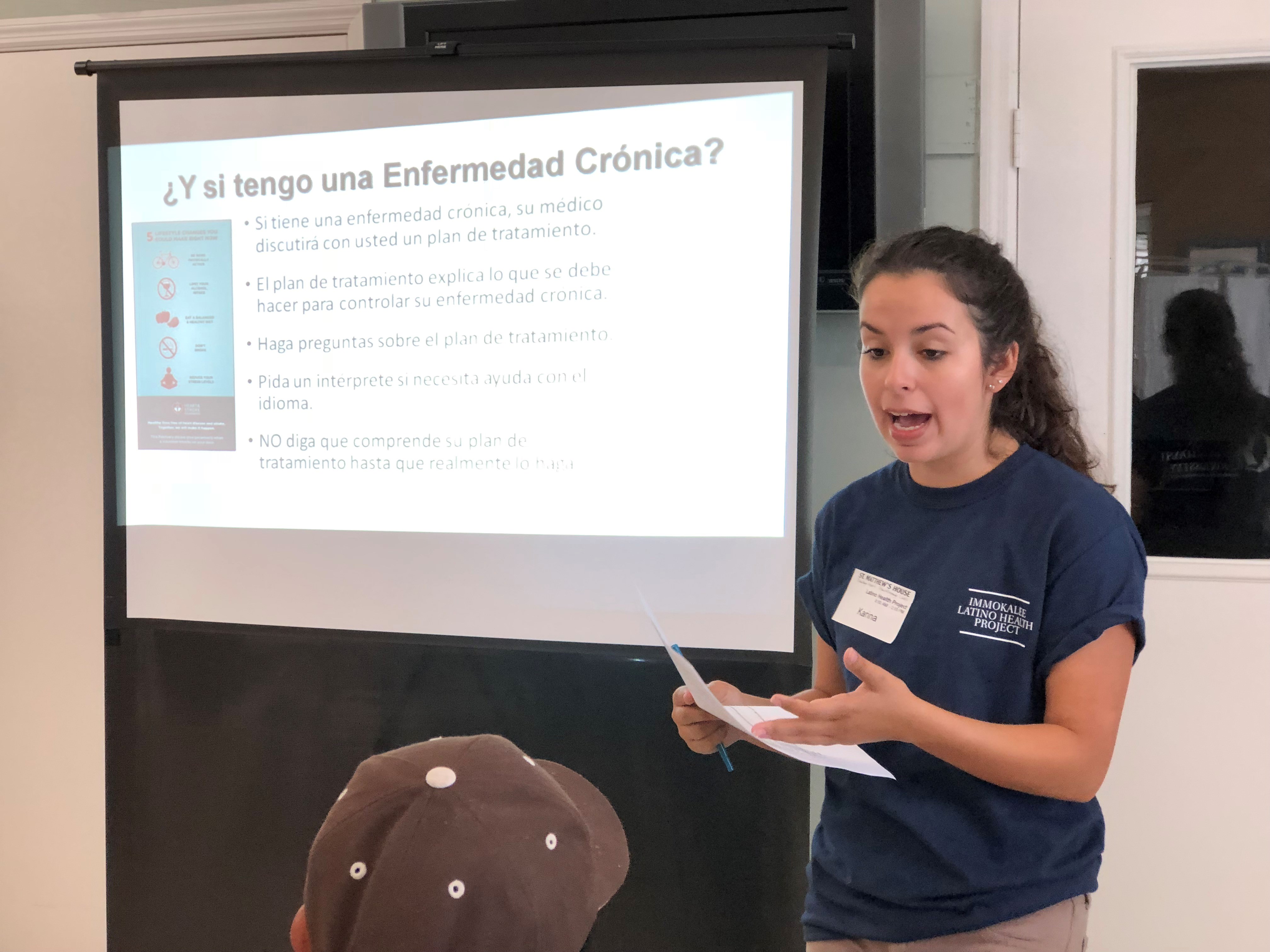
23 Sep 2020 Improving Lives Through Health Education and Screenings
The time-honored axiom that an ounce of prevention is worth a pound of cure has never been more valid than when applied to our health. The prospects for an enhanced quality of life, the financial pressures placed on families and the often avoidable strain placed on healthcare system resources can all be positively impacted when the emphasis is placed on knowledge-based health education and screenings as a pathway to prevention.
Providing such education and health screenings is the goal of the Immokalee Health Project, whose mission is to enhance the well-being of the Latino and Haitian communities through increased preventative understanding as well as self-management care among those with existing health conditions. The program is designed to create a model for the standardized delivery of health education, health screenings and follow-ups.
The initiative is being led by FGCU faculty members Lirio Negroni, associate professor in the department of social work; and Payal Kahar, assistant professor in the department of health services. Their two research studies dating back to 2017 and 2018, revealed fragmented healthcare options in Immokalee focused primarily on treatment, not prevention. The project is positioned to fill an information gap that will allow Immokalee’s Latino and Haitian families to live healthier lives. Those populations face multiple barriers when it comes to health, whether it’s lack of health insurance, economic hardships or access to more comprehensive healthcare facilities in neighboring counties.
“These are families with an average of three to four members, so there are children involved,” Dr. Negroni points out. “Additionally, Immokalee is kind of an isolated geographical area, so transportation can be difficult. And language is another challenge.”
She says an underlying lack of trust in service providers can often prevent residents from accessing healthcare resources. “Because this is a population where there are those who are undocumented, they have concerns about trusting someone providing services and being at risk of potentially being deported and being separated from their families. That impacts the health care they receive.”
The program’s health-education component is built upon community workshops, supported by FGCU students serving as research assistants, to be held in community gathering spaces such as St. Matthew’s Friendship House, Our Lady of Guadalupe Catholic church and Bethel Immokalee church, and there will be physician assistants to implement health screenings.
Additionally, “There will be 45-minute workshops with an interactive session at the end,” says Dr. Payal. “We’ll assess the participants’ knowledge levels before and after the workshops, as we’ve done in the past to gauge effectiveness.” She adds that three languages are necessary to convey important information: English, Spanish and Creole for a growing Haitian population.
When COVID-19 hit, an additional information barrier surfaced as the world pivoted to remote meetings on platforms such as Zoom video: a lack of technology resources at lower socioeconomic levels. “Most of these populations do not have access to technology,” Dr. Payal notes. “For those who do, an overlaying factor is how does that online platform that they might not be familiar with impact learning?”
Although the pandemic has temporarily delayed implementing the program, the two faculty members have remained focused on community engagement, including presenting to the Immokalee Interagency Council, an organization that spans a comprehensive range of community groups that meet monthly.
Dr. Negroni says, “We’ve been focused on strengthening our relationships with the community through the Council. We’ve been participating as Council members and have been able to discuss the project and learn more about local resources and potential partners who can join with us to most effectively implement it, particularly when it comes to building trust among the Haitian community.”
During these months of unprecedented disruption, the project’s co-directors say the long-term vision of the Southwest Florida Community Foundation has allowed them to remain focused on their mission, secure in the knowledge that they have a community partner to stand with them through the current challenge.
“They’ve been so supportive with communications, flexibility and encouragement,” Dr. Negroni says. “They extended the grant monies to accommodate when we are able to begin and also for the support of a second program year. They’ve just been tremendous.”
Dr. Payal adds, “We feel very fortunate to have their support and trust, which has relieved a lot of pressure. There are challenges in Immokalee made more complicated by the situation with COVID-19, but we are able to continue to move forward.”
And continuing to move forward means bolstering community engagement and understanding, so when community spaces can be opened once more to health education, the Immokalee Health Project is ready to convert an ounce of prevention into a lifetime of improved health outcomes.
For more information, please contact Lirio Negroni at [email protected] or Payal Kahar at [email protected].
This article is part of a summer series that highlights the vital work of regional recipients of 2020 Community Impact Grants from the Southwest Florida Community Foundation.
About the Southwest Florida Community Foundation
The Southwest Florida Community Foundation, founded in 1976, cultivates regional change for the common good through collective leadership, social innovation and philanthropy to address the evolving community needs in Lee, Collier, Charlotte, Hendry and Glades counties. The Foundation partners with individuals, families and corporations who have created more than 400 philanthropic funds. Thanks to them, the Foundation invested $7.7 million in grants and programs to the community. With assets of $134.9 million, it has provided $85 million in grants and scholarships to the communities it serves since inception. The Foundation is the backbone organization for the regional FutureMakers Coalition and Lee County’s Sustainability Plan. The Southwest Florida Community Foundation’s regional headquarters are now located in the historic ACL Train Depot at Collaboratory in downtown Fort Myers, with a satellite office located in LaBelle (Hendry County). For more information, call 239-274-5900 or visit www.floridacommunity.com



